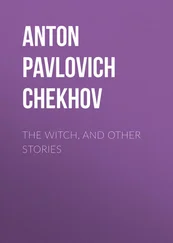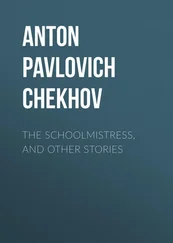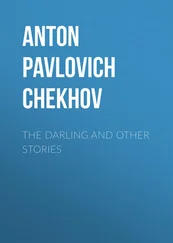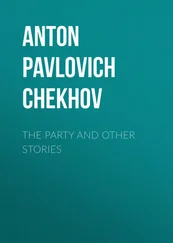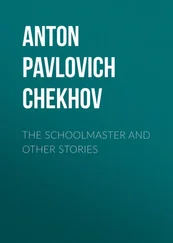Anton Chekhov - The Bishop and Other Stories
Здесь есть возможность читать онлайн «Anton Chekhov - The Bishop and Other Stories» весь текст электронной книги совершенно бесплатно (целиком полную версию без сокращений). В некоторых случаях можно слушать аудио, скачать через торрент в формате fb2 и присутствует краткое содержание. Жанр: Классическая проза, на английском языке. Описание произведения, (предисловие) а так же отзывы посетителей доступны на портале библиотеки ЛибКат.
- Название:The Bishop and Other Stories
- Автор:
- Жанр:
- Год:неизвестен
- ISBN:нет данных
- Рейтинг книги:3 / 5. Голосов: 1
-
Избранное:Добавить в избранное
- Отзывы:
-
Ваша оценка:
- 60
- 1
- 2
- 3
- 4
- 5
The Bishop and Other Stories: краткое содержание, описание и аннотация
Предлагаем к чтению аннотацию, описание, краткое содержание или предисловие (зависит от того, что написал сам автор книги «The Bishop and Other Stories»). Если вы не нашли необходимую информацию о книге — напишите в комментариях, мы постараемся отыскать её.
The Bishop and Other Stories — читать онлайн бесплатно полную книгу (весь текст) целиком
Ниже представлен текст книги, разбитый по страницам. Система сохранения места последней прочитанной страницы, позволяет с удобством читать онлайн бесплатно книгу «The Bishop and Other Stories», без необходимости каждый раз заново искать на чём Вы остановились. Поставьте закладку, и сможете в любой момент перейти на страницу, на которой закончили чтение.
Интервал:
Закладка:
"Mates," said Styopka in amazement, "Vassya is eating a live gudgeon!
Phoo!"
"It's not a gudgeon, but a minnow," Vassya answered calmly, still munching.
He took a fish's tail out of his mouth, looked at it caressingly, and put it back again. While he was chewing and crunching with his teeth it seemed to Yegorushka that he saw before him something not human. Vassya's swollen chin, his lustreless eyes, his extraordinary sharp sight, the fish's tail in his mouth, and the caressing friendliness with which he crunched the gudgeon made him like an animal.
Yegorushka felt dreary beside him. And the fishing was over, too. He walked about beside the waggons, thought a little, and, feeling bored, strolled off to the village.
Not long afterwards he was standing in the church, and with his forehead leaning on somebody's back, listened to the singing of the choir. The service was drawing to a close. Yegorushka did not understand church singing and did not care for it. He listened a little, yawned, and began looking at the backs and heads before him. In one head, red and wet from his recent bathe, he recognized Emelyan. The back of his head had been cropped in a straight line higher than is usual; the hair in front had been cut unbecomingly high, and Emelyan's ears stood out like two dock leaves, and seemed to feel themselves out of place. Looking at the back of his head and his ears, Yegorushka, for some reason, thought that Emelyan was probably very unhappy. He remembered the way he conducted with his hands, his husky voice, his timid air when he was bathing, and felt intense pity for him. He longed to say something friendly to him.
"I am here, too," he said, putting out his hand.
People who sing tenor or bass in the choir, especially those who have at any time in their lives conducted, are accustomed to look with a stern and unfriendly air at boys. They do not give up this habit, even when they leave off being in a choir. Turning to Yegorushka, Emelyan looked at him from under his brows and said:
"Don't play in church!"
Then Yegorushka moved forwards nearer to the ikon-stand. Here he saw interesting people. On the right side, in front of everyone, a lady and a gentleman were standing on a carpet. There were chairs behind them. The gentleman was wearing newly ironed shantung trousers; he stood as motionless as a soldier saluting, and held high his bluish shaven chin. There was a very great air of dignity in his stand-up collar, in his blue chin, in his small bald patch and his cane. His neck was so strained from excess of dignity, and his chin was drawn up so tensely, that it looked as though his head were ready to fly off and soar upwards any minute. The lady, who was stout and elderly and wore a white silk shawl, held her head on one side and looked as though she had done someone a favour, and wanted to say: "Oh, don't trouble yourself to thank me; I don't like it . . . ." A thick wall of Little Russian heads stood all round the carpet.
Yegorushka went up to the ikon-stand and began kissing the local ikons. Before each image he slowly bowed down to the ground, without getting up, looked round at the congregation, then got up and kissed the ikon. The contact of his forehead with the cold floor afforded him great satisfaction. When the beadle came from the altar with a pair of long snuffers to put out the candles, Yegorushka jumped up quickly from the floor and ran up to him.
"Have they given out the holy bread?" he asked.
"There is none; there is none," the beadle muttered gruffly. "It is no use your. . ."
The service was over; Yegorushka walked out of the church in a leisurely way, and began strolling about the market-place. He had seen a good many villages, market-places, and peasants in his time, and everything that met his eyes was entirely without interest for him. At a loss for something to do, he went into a shop over the door of which hung a wide strip of red cotton. The shop consisted of two roomy, badly lighted parts; in one half they sold drapery and groceries, in the other there were tubs of tar, and there were horse-collars hanging from the ceiling; from both came the savoury smell of leather and tar. The floor of the shop had been watered; the man who watered it must have been a very whimsical and original person, for it was sprinkled in patterns and mysterious symbols. The shopkeeper, an overfed-looking man with a broad face and round beard, apparently a Great Russian, was standing, leaning his person over the counter. He was nibbling a piece of sugar as he drank his tea, and heaved a deep sigh at every sip. His face expressed complete indifference, but each sigh seemed to be saying:
"Just wait a minute; I will give it you."
"Give me a farthing's worth of sunflower seeds," Yegorushka said, addressing him.
The shopkeeper raised his eyebrows, came out from behind the counter, and poured a farthing's worth of sunflower seeds into Yegorushka's pocket, using an empty pomatum pot as a measure. Yegorushka did not want to go away. He spent a long time in examining the box of cakes, thought a little and asked, pointing to some little cakes covered with the mildew of age:
"How much are these cakes?"
"Two for a farthing."
Yegorushka took out of his pocket the cake given him the day before by the Jewess, and asked him:
"And how much do you charge for cakes like this?"
The shopman took the cake in his hands, looked at it from all sides, and raised one eyebrow.
"Like that?" he asked.
Then he raised the other eyebrow, thought a minute, and answered:
"Two for three farthings. . . ."
A silence followed.
"Whose boy are you?" the shopman asked, pouring himself out some tea from a red copper teapot.
"The nephew of Ivan Ivanitch."
"There are all sorts of Ivan Ivanitchs," the shopkeeper sighed. He looked over Yegorushka's head towards the door, paused a minute and asked:
"Would you like some tea?"
"Please. . . ." Yegorushka assented not very readily, though he felt an intense longing for his usual morning tea.
The shopkeeper poured him out a glass and gave him with it a bit of sugar that looked as though it had been nibbled. Yegorushka sat down on the folding chair and began drinking it. He wanted to ask the price of a pound of sugar almonds, and had just broached the subject when a customer walked in, and the shopkeeper, leaving his glass of tea, attended to his business. He led the customer into the other half, where there was a smell of tar, and was there a long time discussing something with him. The customer, a man apparently very obstinate and pig-headed, was continually shaking his head to signify his disapproval, and retreating towards the door. The shopkeeper tried to persuade him of something and began pouring some oats into a big sack for him.
"Do you call those oats?" the customer said gloomily. "Those are not oats, but chaff. It's a mockery to give that to the hens; enough to make the hens laugh. . . . No, I will go to Bondarenko."
When Yegorushka went back to the river a small camp fire was smoking on the bank. The waggoners were cooking their dinner. Styopka was standing in the smoke, stirring the cauldron with a big notched spoon. A little on one side Kiruha and Vassya, with eyes reddened from the smoke, were sitting cleaning the fish. Before them lay the net covered with slime and water weeds, and on it lay gleaming fish and crawling crayfish.
Emelyan, who had not long been back from the church, was sitting beside Panteley, waving his arm and humming just audibly in a husky voice: "To Thee we sing. . . ." Dymov was moving about by the horses.
When they had finished cleaning them, Kiruha and Vassya put the fish and the living crayfish together in the pail, rinsed them, and from the pail poured them all into the boiling water.
"Shall I put in some fat?" asked Styopka, skimming off the froth.
Читать дальшеИнтервал:
Закладка:
Похожие книги на «The Bishop and Other Stories»
Представляем Вашему вниманию похожие книги на «The Bishop and Other Stories» списком для выбора. Мы отобрали схожую по названию и смыслу литературу в надежде предоставить читателям больше вариантов отыскать новые, интересные, ещё непрочитанные произведения.
Обсуждение, отзывы о книге «The Bishop and Other Stories» и просто собственные мнения читателей. Оставьте ваши комментарии, напишите, что Вы думаете о произведении, его смысле или главных героях. Укажите что конкретно понравилось, а что нет, и почему Вы так считаете.





